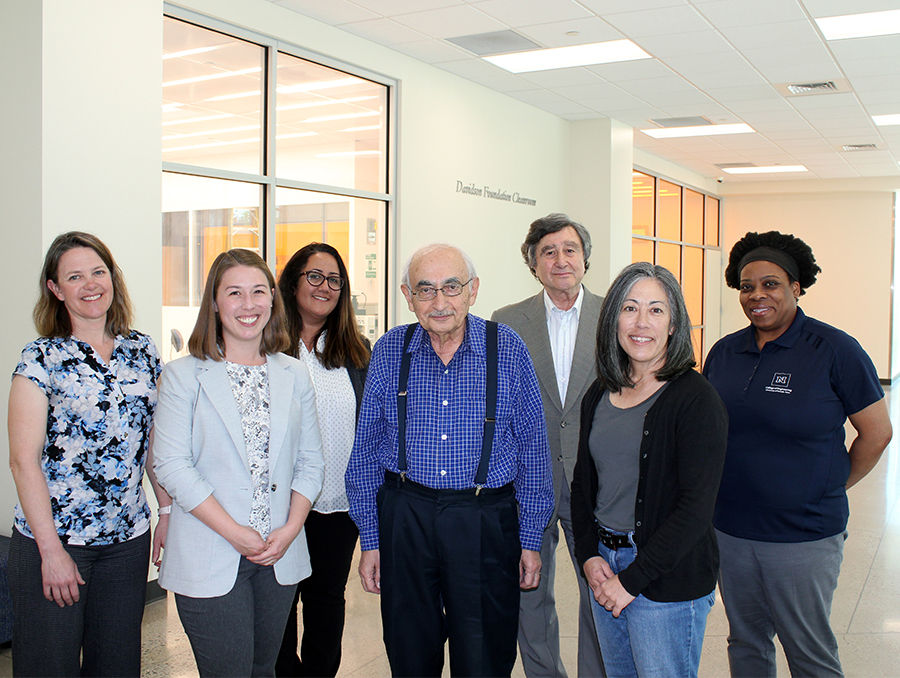Wally Miller's career has come full circle since he started in the University of Nevada Cooperative Extension 35 years ago.
Dressed in a purple shirt, a gold-and-purple tie, and his trademark pair of jeans, the professor of natural resources and environmental science waited for a meeting with another Miller, Nevada Secretary of State Ross Miller. As he waited, Miller reflected on where his work has taken him since he began in 1973.
With a twinkle in his eye he said, "They call me the ‘old guy.’ It’s not just because I am old, but also because I’m one of the few scientists left in the College of Agriculture, Biotechnology and Natural Resources who still knows about water requirements for alfalfa production."
Alfalfa production was a major focus of the college until the late 1980’s.
"I started out primarily in agriculture studying water and nutrient requirements for crop production and the related impacts of irrigation return flows on water quality, then spent 25 years studying nutrient cycling and runoff water quality in forested areas in the Tahoe Basin and eastern Sierras," he said. "Now I’m back looking at ag, water requirements, crop production, and the impacts of reduced water supply on alternative crops and land restoration with the Walker Basin Project, which is essentially where I started."
However, according to Miller, the work has taken on a bit different perspective. Looking at how much water it takes to produce a crop in the Walker Basin is only part of the focus today.
"The temperatures are warmer now so it probably takes more water to get the same results. I know I’m thirstier when it’s hotter," he said. "However, an increased demand for alternative use coupled with a finite water supply means less water is available for irrigation, thus dictating the need to use the water more efficiently.
"This not only has an effect on the agro-ecosystem, but on surrounding ecosystems as well. We can’t just abandon the land. Studies have found as much dust coming off a field abandoned 70-80 years ago as those abandoned as recently as 4-5 years ago. This emphasizes the need for restoration management.
"However, we don’t know how much water must be left on the land or for how long to restore plant vegetation typical of the more historic desert and adjacent wetland ecosystems. Consequently, we’re looking at how much water is needed for alternative crop production as well as the water requirements for restoration."
Miller said there is potential for successful production of alternative, low-water-use crops in the Walker Basin. Studies elsewhere have shown certain crops have the potential to be more profitable than alfalfa when using less water; however the crops and associated agricultural practices must be studied to see if they can be adapted to Nevada. Miller and his team are also studying alternative crops which can be marketed as biomass, an expanding industry as interest in sustainable fuel sources grows.
Miller and his research colleagues have planted various alternative crops and native vegetation on sites in the Wildlife Management Area and in Mason Valley. These plots will be studied for two growing seasons to help determine the feasibility and economic potential of low-water-use, alternative crops as well as the successful re-establishment of native plants and shrubs that will support low water usage and minimize soil erosion.
After beginning as a soil and water quality specialist, Miller has spent the last 20-25 years teaching and researching. He also serves as associate director of research for the Academy for the Environment.
Most of his recent work has focused on how nutrients get into streams in the Tahoe upper watershed and the lake. He looks at how the nutrients are transported, how they respond to different management strategies or catastrophic events such as wildfires, and the impact they have on runoff water quality.
"Fire suppression causes more accumulation of biomass and more available nutrients that can potentially move into upper watershed tributaries," said Miller. "The best management strategy appears to be a combination of mechanical fuel reduction or harvesting and controlled burns."
His 2002 Gondola Wildfire study led to new soils management strategies in the Tahoe Basin.
He is most proud of his discovery of the presence of overland flow runoff in the forested watersheds of the Tahoe Basin. At the time, textbooks and professors in the field assumed there was no overland runoff from forested areas containing a heavy underbrush and thick forest floor.
Miller, along with two other colleagues, Dale Johnson and Roger Walker, on a whim developed a device to measure if any water was flowing over the surface without gaining enough velocity to cause erosion. What they found surprised them. There was a very slow runoff through the organic matter and over the soil surface which was not causing erosion but was carrying high concentrations of bio-available nutrients.
Miller won an award at the 2007 annual meeting of the Soil Science Society of America for best paper on Fire Effects using data from the runoff collectors.
He also served on the Water Quality Panel with Vice President Al Gore at the 1997 Lake Tahoe Presidential Summit. At last summer’s 10-year anniversary of the event, the University of Nevada, Reno and the Academy for the Environment published a document that summarized 10 years of University research in support of the conservation and restoration of Lake Tahoe. Miller was one of three scientists who reviewed nearly 80 different University research publications in preparing the synopsis.
There is great satisfaction for Miller in his work. "When I first got here, I was inspired by the U.S. Secretary of Agriculture who spoke at a seminar I attended. He talked about the importance of ‘turning the next page in the book of knowledge,’ which is exactly what we as researchers and educators should do. I think I’ve been able to provide a couple of things over the years that I felt were real contributions to our knowledge base. I like problem-solving, publishing, teaching and having really good students. It’s just the budgeting and politics that aren’t fun."
Reared in Southern California, Miller’s father was a fertilizer/seed salesman and his mother a teacher and head counselor, both perhaps setting the stage of his life’s work. At 61, which by today’s standards is not old, one could say Wally Miller is well grounded, despite the obvious pun.
You cannot help but appreciate a man who loves his work, laughs easily and readily proclaims, "You’ve got to enjoy what you do in life. If you don’t, you won’t last long."











